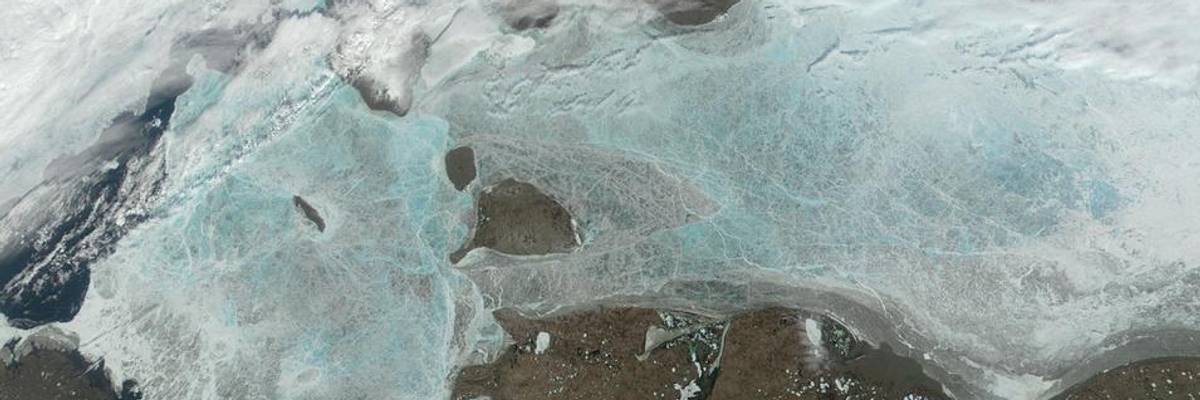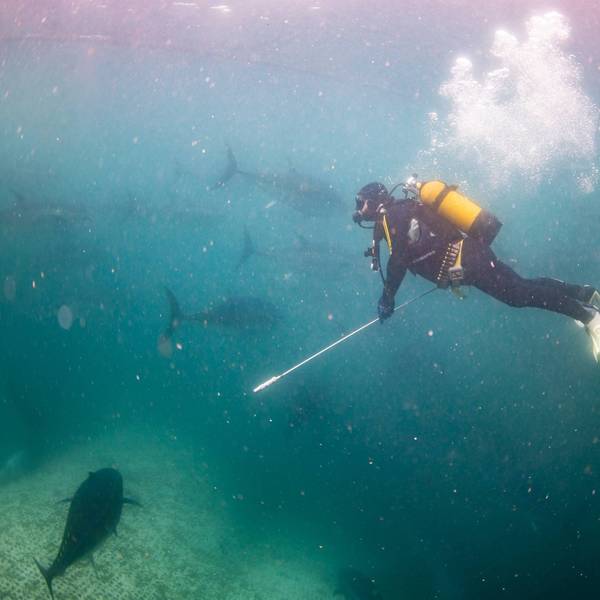
In this satellite view of the Laptev Sea, thinning ice is seen in the blue and green areas. (Photo: NASA)
Researchers Worry Methane Discovery in Arctic Ocean Could Signal Dangerous New Climate Feedback Loop
"Climate warming is awakening the 'sleeping giants' of the carbon cycle," warned one researcher.
An international team of researchers aboard a Russian research ship has discovered evidence that frozen methane deposits in the Arctic Ocean have been dispersing over a large area of Siberia, potentially fueling a dangerous new climate feedback loop.
The Guardian reports the International Siberian Shelf Study (ISSS-2020) found that slope sediments spreading over much of the continental shelf are rich in frozen methane hydrates that have been detected to a depth of 1,150 feet in the Laptev Sea.
Although the scientists said that most of the methane hydrate bubbles are dissolving in the water, methane levels at the sea surface are four to eight times higher than normal and the gas is venting into the atmosphere. What makes methane especially dangerous is that its heating effect is 80 times stronger than CO2 over 20 years. The new discovery has raised serious concerns that a new climate feedback loop may be starting.
According to ISSS-2020:
One of the greatest uncertainties surrounding climate warming [concerns] the emission of naturally accurring greenhouse gases, such as methane, carbon dioxide, and nitrous oxide (N2O) from Arctic thawing permafrost, and collapsing methane hydrates--crystals made of methane gas molecules "caged" between solid water molecules--in the seabed north of Siberia will increase in the future.
"At this moment, there is unlikely to be any major impact on global warming, but the point is that this process has now been triggered," Stockholm University researcher Orjan Gustafsson told The Guardian. "This East Siberian slope methane hydrate system has been perturbed and the process will be ongoing."
Gustafsson, a member of the research team, warned last month that "climate warming is awakening the 'sleeping giants' of the carbon cycle, namely permafrost and methane hydrates."
"How much this will lead to added emissions of the strong greenhouse gas methane is poorly understood," he said. "This is one of the grand challenges in current climate change research and a central goal of the expedition to address."
The chief scientist aboard the vessel, Igor Semiletov of the Russian Academy of Sciences, called the hydrate discharges "significantly larger" than anything previously seen.
"The discovery of actively releasing shelf slope hydrates is very important and unknown until now," Semiletov told The Guardian. "This is a new page. Potentially they can have serious climate consequences, but we need more study before we can confirm that."
An Urgent Message From Our Co-Founder
Dear Common Dreams reader, The U.S. is on a fast track to authoritarianism like nothing I've ever seen. Meanwhile, corporate news outlets are utterly capitulating to Trump, twisting their coverage to avoid drawing his ire while lining up to stuff cash in his pockets. That's why I believe that Common Dreams is doing the best and most consequential reporting that we've ever done. Our small but mighty team is a progressive reporting powerhouse, covering the news every day that the corporate media never will. Our mission has always been simple: To inform. To inspire. And to ignite change for the common good. Now here's the key piece that I want all our readers to understand: None of this would be possible without your financial support. That's not just some fundraising cliche. It's the absolute and literal truth. We don't accept corporate advertising and never will. We don't have a paywall because we don't think people should be blocked from critical news based on their ability to pay. Everything we do is funded by the donations of readers like you. Will you donate now to help power the nonprofit, independent reporting of Common Dreams? Thank you for being a vital member of our community. Together, we can keep independent journalism alive when it’s needed most. - Craig Brown, Co-founder |
An international team of researchers aboard a Russian research ship has discovered evidence that frozen methane deposits in the Arctic Ocean have been dispersing over a large area of Siberia, potentially fueling a dangerous new climate feedback loop.
The Guardian reports the International Siberian Shelf Study (ISSS-2020) found that slope sediments spreading over much of the continental shelf are rich in frozen methane hydrates that have been detected to a depth of 1,150 feet in the Laptev Sea.
Although the scientists said that most of the methane hydrate bubbles are dissolving in the water, methane levels at the sea surface are four to eight times higher than normal and the gas is venting into the atmosphere. What makes methane especially dangerous is that its heating effect is 80 times stronger than CO2 over 20 years. The new discovery has raised serious concerns that a new climate feedback loop may be starting.
According to ISSS-2020:
One of the greatest uncertainties surrounding climate warming [concerns] the emission of naturally accurring greenhouse gases, such as methane, carbon dioxide, and nitrous oxide (N2O) from Arctic thawing permafrost, and collapsing methane hydrates--crystals made of methane gas molecules "caged" between solid water molecules--in the seabed north of Siberia will increase in the future.
"At this moment, there is unlikely to be any major impact on global warming, but the point is that this process has now been triggered," Stockholm University researcher Orjan Gustafsson told The Guardian. "This East Siberian slope methane hydrate system has been perturbed and the process will be ongoing."
Gustafsson, a member of the research team, warned last month that "climate warming is awakening the 'sleeping giants' of the carbon cycle, namely permafrost and methane hydrates."
"How much this will lead to added emissions of the strong greenhouse gas methane is poorly understood," he said. "This is one of the grand challenges in current climate change research and a central goal of the expedition to address."
The chief scientist aboard the vessel, Igor Semiletov of the Russian Academy of Sciences, called the hydrate discharges "significantly larger" than anything previously seen.
"The discovery of actively releasing shelf slope hydrates is very important and unknown until now," Semiletov told The Guardian. "This is a new page. Potentially they can have serious climate consequences, but we need more study before we can confirm that."
An international team of researchers aboard a Russian research ship has discovered evidence that frozen methane deposits in the Arctic Ocean have been dispersing over a large area of Siberia, potentially fueling a dangerous new climate feedback loop.
The Guardian reports the International Siberian Shelf Study (ISSS-2020) found that slope sediments spreading over much of the continental shelf are rich in frozen methane hydrates that have been detected to a depth of 1,150 feet in the Laptev Sea.
Although the scientists said that most of the methane hydrate bubbles are dissolving in the water, methane levels at the sea surface are four to eight times higher than normal and the gas is venting into the atmosphere. What makes methane especially dangerous is that its heating effect is 80 times stronger than CO2 over 20 years. The new discovery has raised serious concerns that a new climate feedback loop may be starting.
According to ISSS-2020:
One of the greatest uncertainties surrounding climate warming [concerns] the emission of naturally accurring greenhouse gases, such as methane, carbon dioxide, and nitrous oxide (N2O) from Arctic thawing permafrost, and collapsing methane hydrates--crystals made of methane gas molecules "caged" between solid water molecules--in the seabed north of Siberia will increase in the future.
"At this moment, there is unlikely to be any major impact on global warming, but the point is that this process has now been triggered," Stockholm University researcher Orjan Gustafsson told The Guardian. "This East Siberian slope methane hydrate system has been perturbed and the process will be ongoing."
Gustafsson, a member of the research team, warned last month that "climate warming is awakening the 'sleeping giants' of the carbon cycle, namely permafrost and methane hydrates."
"How much this will lead to added emissions of the strong greenhouse gas methane is poorly understood," he said. "This is one of the grand challenges in current climate change research and a central goal of the expedition to address."
The chief scientist aboard the vessel, Igor Semiletov of the Russian Academy of Sciences, called the hydrate discharges "significantly larger" than anything previously seen.
"The discovery of actively releasing shelf slope hydrates is very important and unknown until now," Semiletov told The Guardian. "This is a new page. Potentially they can have serious climate consequences, but we need more study before we can confirm that."

